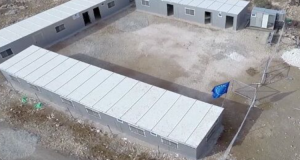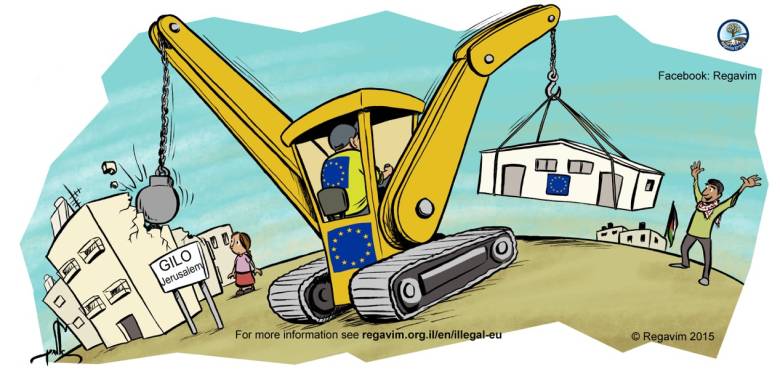Netanyahu Orders Demolition of EU-Funded Illegal Palestinian Homes
Following an NGO expose, PM Netanyahu on Friday ordered the demolition of 400 Palestinian homes built illegally with direct funding from the EU.

An illegal EU structure in Judea and Samaria. (Photo: Regavim)
Prime Minister Benjamin Netanyahu on Friday ordered the dismantling of 400 Palestinian homes that were built illegally in Israeli-controlled areas in Judea and Samaria with direct funding from the European Union (EU).
Regavim, an Israeli NGO monitoring illegal use of Israeli state lands, reveals that the EU invested tens of millions of euros into homes for Palestinians who had not received building permits by the Israeli government.
Official EU documentation, acquired by Regavim and exposed last week in the UK-based Daily Mail, states that the buildings were intended to “pave the way for development and more authority of the Palestinian Authority (PA) over [Israeli-controlled] Area C,” raising concerns that the supposedly neutral EU is again taking sides in favor of the Palestinians.
Direct Violation of Oslo Accords
Under the Oslo Accords between Israel and the PA, the West Bank (Judea and Samaria) is divided into the A, B, and C zones. The PA maintains political and security administration over Area A, Israel has total control of Area C, and they share responsibility for Area B. Therefore, joint EU-PA projects in Area C area direct contravention of the Accords.

EU official Maja Kocijancic initially denied the report. (Photo: inserbia.info)
The PA has apparently been working for many years to grab land from Israel through construction and other methods, in blatant breach of the agreements with Israel.
“This is part of the work done to build the future Palestinian state which will live side by side with Israel,” Shadi Othman, a communications officer at the Office of the European Union Representative in the West Bank and Gaza Strip, told the Daily Mail. “Palestinians have a right to live there, build schools there, have economic development.”
The EU wrote in its September 2014 update to the Humanitarian Implementation Plan for Palestine: “The European Union and the PA are now actively participating in the planning and zoning of Area C which, if successful, could pave the way for development and more authority of the PA over Area C.”
According to Regavim, “The EU has been flouting international law and backing illegal West Bank settlements after all. In fact, it’s been funding and building them directly. Only these West Bank settlements aren’t for Jews, they’re for Palestinians. So apparently the rules don’t apply.”
Maja Kocijancic, a Brussels-based EU spokesperson, initially denied that such EU plans even existed. “To date, no construction has started yet… The EU is not funding illegal projects,” she claimed.
However, a newly released report by Regavim documents the illegal EU construction, which has EU flags and signs all over it. Kocijancic declined to remark on the photos.
Ari Briggs, international director of Regavim and the report’s principal author, told the Daily Mail that the EU and Oxfam were using the project as a “Trojan horse” to undercut Israeli control of Area C.

In a discussion with United with Israel, Briggs noted the EU’s “shift in tactic” in the past couple of years. Whereas the EU used to give money to the PA to use however it wished, the Europeans are now funding construction directly, through their own NGOs. They’re “totally involved in the whole process,” Briggs stated. They are “totally on board, doing it themselves in conjunction with the Palestinians.”
Asked if he expects any major change in Israeli government policy as a result of Regavim’s expose, which was widely reported in mainstream media, Briggs said that “nothing is going to happen” in the short term.
“Exposing the information is very important, and the government is being reached at the highest level, but the Supreme Court has been involved from Day One. Since 2009 it has not allowed the government to demolish these structures until they find a suitable location. The government is working on it.”
Regavim Will Continue the Struggle
“We understand the limitations put on the government by the Supreme Court,” Briggs said. “We have decided to take the fight to the EU…based on their breaking their own treaty of not respecting other countries’ sovereignty [and] not respecting international law.”

Illegal building for Palestinians (Photo: Regavim)
Regavim will continue the struggle “to ensure that something is done.”
The media exposure was “100 percent” a boost. “We understand that in the next few days there will be more stories. Keeping people aware is the biggest challenge that we face,” he said.
James Carver, a British Member of the European Parliament, for the West Midlands region, wrote a letter this week to the Parliament’s Committee on Foreign Affairs, condemning the “illegal” project
“The structures all bear the name and flag of the EU, and official EU agents have been photographed participating in overseeing the construction, so the active involvement of the EU can hardly be denied. I kindly call upon you to do your utmost to bring an end to these illegal and destructive activities,” he stated.
Yariv Levin, head of the Knesset’s Foreign Affairs and Defense committee, accused the EU of duplicity, the Daily Mail reports. “It is hypocritical of the EU to criticize Israeli construction while at the same time actively supporting and practically taking part in illegal Palestinian settlement construction on Israeli land,” Levin asserted.
Professor Eugene Kontorovich, an international lawyer from the Northwestern University School of Law in Chicago, told the Daily Mail: “There’s no question, the EU is openly in violation of international law.”
Alan Baker, an international lawyer who was involved in drafting the Oslo Accords, said that the EU’s actions were illegal, the Daily Mail reports.
“The EU is a signatory to the Oslo Accords, so they cannot pick and choose when they recognize it,” Baker affirmed. “According to international law, all building in Area C must have permission from Israel, whether it is temporary or permanent. The same principle applies anywhere in the world. If you want to build, you need planning permission.
“The EU is ignoring international law and taking concrete steps to influence the facts on the ground,” Baker declared.
The EU has repeatedly censured Israel for construction in Jerusalem and elsewhere in Area C.
Just last week the EU condemned Israel for newly announced buildings plans. “Israel should reverse these decisions, thereby putting an end to settlement expansion,” the EU stated, claiming that building housing for the residents would be “inflaming the very tense situation on the ground.”
By United with Israel Staff
Sign the Petition to Stop Funding the Palestinian Authority
Petition to the United States and European Union
We demand that all funding of the PA be stopped immediately. Unity with Hamas led to brutal murders, thousands of rockets and ongoing incitement against Israeli citizens. Prosecuting Israel for “war crimes” is despicable and makes funding the PA against US law.

British fighting terror in Palestine
ReplyDeleteHow the British Fought Arab Terror in Jenin and elsewhere in Palestine
"Demolishing the homes of Arab civilians…" "Shooting handcuffed prisoners…" "Forcing local Arabs to test areas where mines may have been planted…" These sound like the sort of accusations made by British and other European officials concerning Israel's recent actions in. In fact, they are descriptions from official British documents concerning the methods used by the British authorities to combat Palestinian Arab terrorism in Palestine and elsewhere in 1938.
The documents were declassified by London in 1989. They provide details of the British Mandatory government's response to the assassination of a British district commissioner by a Palestinian Arab terrorist in Jenin in the summer of 1938. Even after the suspected assassin was captured (and then shot dead while allegedly trying to escape), the British authorities decided that "a large portion of the town should be blown up" as punishment. On August 25 of that year, a British convoy brought 4,200 kilos of explosives to Jenin for that purpose. In the Jenin operation and on other occasions, local Arabs were forced to drive "mine-sweeping taxis" ahead of British vehicles in areas where Palestinian Arab terrorists were believed to have planted mines, in order "to reduce [British] land mine casualties." The British authorities frequently used these and similar methods to combat Palestinian Arab terrorism in the late 1930s. British forces responded to the presence of terrorists in the Arab village of Miar, north of Haifa, by blowing up house after house in October 1938. "When the troops left, there was little else remaining of the once busy village except a pile of mangled masonry," the New York Times reported.
The declassified documents refer to an incident in Jaffa in which a handcuffed prisoner was shot by the British police. Under Emergency Regulation 19b, the British Mandate government could demolish any house located in a village where terrorists resided, even if that particular house had no direct connection to terrorist activity. Mandate official Hugh Foot later recalled "When we thought that a village was harboring rebels, we would go there and mark one of the large houses. Then, if an incident was traced to that village, we would blow up the house we had marked." The High Commissioner for Palestine, Harold MacMichael, defended the practice "The provision is drastic, but the situation has demanded drastic powers."
MacMichael was furious over what he called the "grossly exaggerated accusations" that England's critics were circulating concerning British anti-terror tactics in Palestine. Arab allegations that British soldiers gouged out the eyes of Arab prisoners were quoted prominently in the Nazi German press and elsewhere.
The declassified documents also record discussions among officials of the Colonial Office concerning the anti-terror methods used in Palestine. Lord Dufferin remarked "British lives are being lost and I do not think that we, from the security of Whitehall, can protest squeamishly about measures taken by the men in the frontline." Sir John Shuckburgh defended the tactics on the grounds that the British were confronted "not with a chivalrous opponent playing the game according to the rules, but with gangsters and murderers."
There were many differences between British policy in the 1930's and Israeli policy today, but two stand out. The first is that the British, faced with a level of Palestinian Arab terrorism considerably less lethal than that which Israel faces today, nevertheless utilized anti-terror methods considerably harsher than those used by Israeli forces. The second is that when the situation became unbearable, the British could go home; the Israelis, by contrast, have no other place to go.